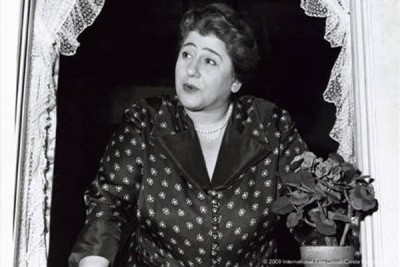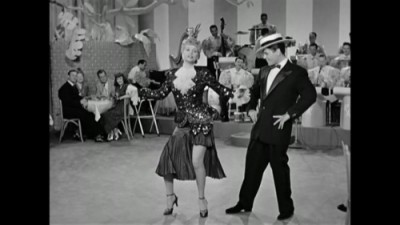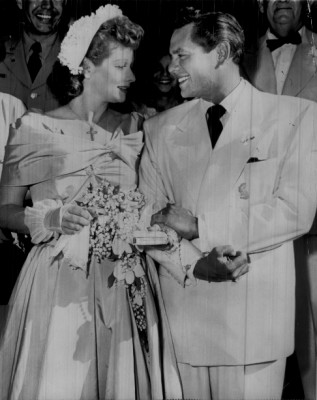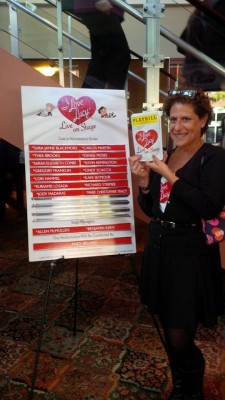Love My Lucy!

A blog post by Education Director Ilene Dackman-Alon. To read more posts by Ilene click HERE.
Ok, I was very excited when Paul Simon: Words & Music was installed in the Feldman Gallery. I loved seeing all of the objects and images relating to Simon’s amazing music career. But, I have to admit that I was “over the moon” when I saw the image of Lucille Ball in the exhibit on the cover of the United In-Flight magazine dated November 1968. The label indicated that Simon scribbled the first draft of his famous, “The Boxer song in the magazine.
For those that don’t know – I am a closet “I Love Lucy “freak and I try and get a dose of her daily. I have been watching reruns of I love Lucy since I was a little girl. I even have my own little I Love Lucy/Lucille Ball memorabilia collection proudly displayed throughout our home. I actually squealed from excitement when I saw Lucy’s image in the Paul Simon exhibit.
So that got me thinking- what were the Jewish connections to Lucille Ball and “I Love Lucy”? Here are some tidbits that I found in connection with Jewish Lucy!
Before I Love Lucy came on the air in 1951, the pioneer radio show, The Goldbergs was a popular show for over 17 years featuring Gertrude Berg as Molly Goldberg. Berg created an endearing but somewhat scatterbrained homemaker whose good intentions often led to comic mishaps—which was not unlike her contemporary, Lucille Ball’s Lucy Ricardo on I Love Lucy. “The Goldbergs” blazed the trail for I Love Lucy and all other sitcoms to follow!

Jess Oppenheimer was the creative force behind the I Love Lucy show as series creator, producer, and head writer. Lucille Ball called Oppenheimer “the brains” behind I Love Lucy. In Laughs, Luck…and Lucy, Oppenheimer’s son Gregg recalls growing up in his home with his famous dad. “He said in order to be a comedy writer, you had to be seriously maladjusted as a child (laughs). He wasn’t raised Jewish but his mother said if anybody asks, tell them you’re Jewish and proud of it.”

In looking for Jewish references in the 180 episodes of the show, I discovered that there is a Jewish connection in the third episode of the series, “The Diet.” This is the first time where we hear the name of McGillicuddy as Lucy’s maiden name. It was originally supposed to be Teitelbaum, but the writers decided that the name might sound too Jewish.

Lucille Ball was not Jewish. She was born into a Protestant family and she identified herself as a Protestant throughout her life, although she flirted with superstition and numerology.
When Lucille Ball married Desi Arnaz, many predicted they would have difficulties due to their religious differences. Arnaz came from a devout Cuban Catholic family and was also partially adherent to the Afro-Caribbean religion Osha, which was practiced by a large proportion of Cubans. Many trace Arnaz’ famous “Babalu” song to these Osha roots. When Arnaz and Ball were having difficulties conceiving children, Desi’s mother believed that this was because “Lucy and Desi remained unmarried in the eyes of the Catholic Church.” Lucy and Desi had a Roman Catholic ceremony eight years after their initial wedding.

Lucy’s second marriage to comedian Gary Morton, a comedian who worked the Borscht Belt circuit, was Jewish. According to Wikipedia, Morton was born Morton Goldaper in New York City, and he and Lucy were married in New York City’s Marble Collegiate Church. Lucy had attended this church for years because of its pastor, Dr. Norman Vincent Peale. The influence of Peale’s “positive thinking” (about oneself, as well about much else) philosophy on Ball was profound. She is often quoted as saying: I have an everyday religion that works for me. Love yourself first, and everything else falls into line.
The influence of Lucille Ball and I Love Lucy is evident in modern sitcoms. Will & Grace was not only the first prime-time TV show to portray openly-gay main characters, but it also was one of the first shows to feature a Jewish lead female character. The show chronicles best friends and roommates Will, a gay lawyer, and Grace, a straight Jewish interior designer and their wacky friends. Grace, played by Debra Messing, is a redhead, dubbed a modern-day Lucille Ball. Grace, who has a pervasive Jewish sensibility, peppers her dialogue with funny Yiddish words and references to Jewish camp and her bat mitzvah.

I Love Lucy is often regarded as one of the greatest and most influential sitcoms in history. I Love Lucy can lay claim to so many pioneering ideas. It was the first television comedy to use the three-camera format in front of a live studio audience.
It was the first television series to show an interracial couple. It was also the first show to feature a pregnant woman being played by a pregnant woman. The show is still syndicated in dozens of languages across the world, and continues its popularity with today’s audiences. It will and will continue to be my all -time favorite!

